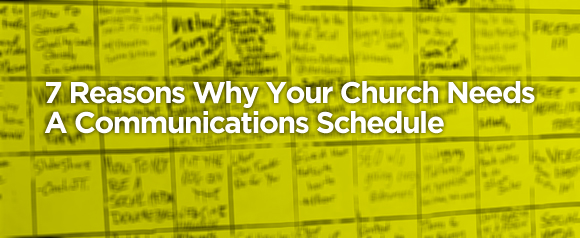It’s a Monday morning. The Sunday service was brilliant, high fives were being given out all around. Everything seemed to go as you thought it would. Until that moment when your colleague, or even worse, your boss walks into your office and says ‘why didn’t we promote/talk about this yesterday?’
You just want the a hole in the ground to open up and swallow you up. You feel your face becoming flushed, a hundred excuses come to the tip of your tongue and your memory for some strange reason finds that this is the perfect time to replay that conversation you had about what they wanted to promote in your mind.
Ever been there?
No? Hopefully I can help you avoid this embarrassing scenario. Note, if you don’t adopt a strategy of scheduling in some way, you are on a crash course to wrecking your communications. Someone once said “If you fail to plan, you plan to fail”. This is a timeless truth is so spot on because I’ve been there and experienced it!
Enter stage right, the superhero to the rescue. By day, some call it a spreadsheet, by night some call it a Superhero Church Communications Plan, or Church Promotional Plan, I simply call it a communications schedule. My communications team has this one schedule because ensures that we are all on the same page and know what’s coming up in the weeks and months to come at church. It means that we miss nothing.
The communications schedule covers every channel we manage for the church. It includes video, printed & email news, blog posts, social media, public relations. You name it. We have a schedule for it. Our video guy knows what to shoot for the news this week because it’s on the schedule. My Communications Manager knows what scripts and blog posts need writing because, wait for it, it’s on the schedule.
You get the drift.
You don’t have to just work at a church to benefit from using a communications schedule, any non-profit of business can create one and leverage it to ensure the right messages get delivered across the right channels.
Here are the seven reasons why you need a communications schedule:
1. You’ll never forget anything again. Ever. Pinky promise. 😉
2. It allows your mind to be free from the clutter of “I must remember this or that”. You are now free to dream, imagine and create.
3. If you fall under a bus today, life and the next Sunday service can keep going 😉
4. It free’s you from the ‘you never told me that’ cop-out. The responsibly falls on everyone’s shoulders because everyone who needs to know has access to it.
5. When you see communication overload you can say ‘sorry, no’ we are at the limit.
6. You will sleep better at night. No more waking up in the middle of the night ‘oh no!’ moments. That’s a promise.
7. See boss walks into your office story at the top of this post 🙂 No more of that!
Tools of the trade
Some use fancy scheduling tools like Basecamp, but you can also use Google Docs, Excel or even the good old whiteboard. You can use almost anything. My only premise would be – Can everyone who needs to get access to it see it whenever or wherever they are?
In the spirit of sharing, I’ve created a 2013 Church Communications Schedule Template for you to use. It’s an Excel file which includes all of the channels I’ve listed above and every week in 2013 is also listed. It’s completely editable and adaptable for your context.
Download it here –> 2013 Comms Schedule_template. (I don’t ask often at all, but if you find this a useful tool can you share it on your social networks)
Your turn
Do you schedule your promotions/communications? What are the tools that you use?
P.S. Kem Meyer shares some great ideas about communications emphasis in my interview with her which complements this post.






